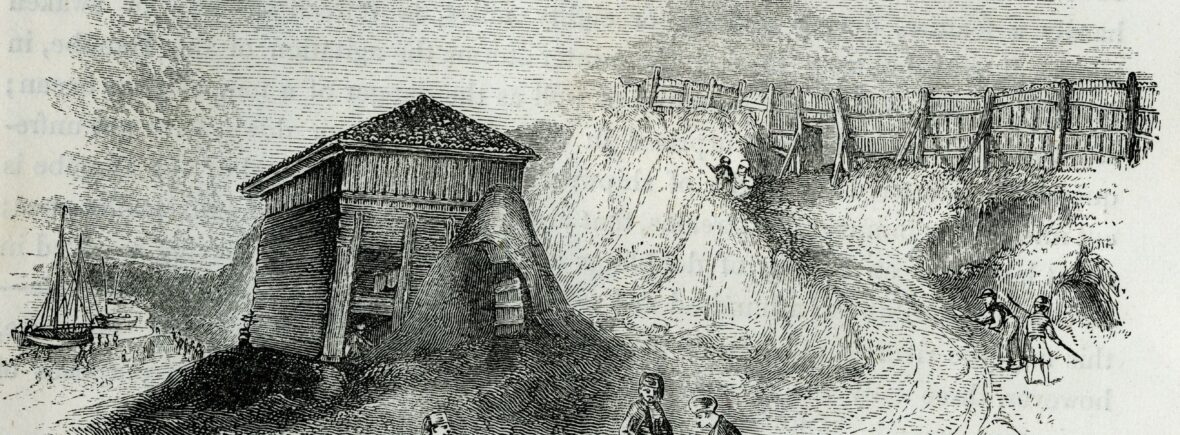2024
The latest issue of the Newsletter of the Society for Romanian Studies includes an interviur (conducted by Anna Batzeli) with Constantin Ardeleanu.
On 14 November 2024, Constantin Ardeleanu presented the paper “Între ‘tihnă’ și ‘tulburare’. Călătorie și carantinare în secolul al XIX-lea” at the symposium “Călători rumăni pren ţerile streine. Despre însemnările de călătorie scrise de români de-a lungul timpului” organised by the “‘Iorgu Iordan – Al. Rosetti’ Institute of Linguistics of the Romanian Academy”.
On 1 November 2024, Constantin Ardeleanu presented the paper “Epidemics and Critical Infrastructure at the Lower Danube in Late Nineteenth and Early Twentieth Centuries” at the Research Training Group KRITIS of the Technical University in Darmstadt.
The Lower Danube region’s geographical location and economic function made it Romania’s busiest commercial gateway. However, it also constituted the main access route for epidemics spreading to Southeast Europe. As a convergence point for maritime and land routes along which plague and cholera were believed to have disseminated from the Far East to Europe, the Lower Danube region – and the town of Sulina in particular – was regarded as a pivotal node in the health security network of Southeast and Central Europe.
The significant cholera outbreak of 1892 illustrated the susceptibility of Sulina and served as a pivotal reminder of the necessity to invest in the development of essential infrastructure in the region, particularly in the areas of water management and healthcare facilities. In 1893, during the International Sanitary Conference in Dresden, and again in 1897 during the Venice Conference, European sanitary experts reiterated the necessity for the Lower Danube to be designated a region of special sanitary status, given its vulnerability and criticality, which posed a security threat to the larger region. The Romanian medical authorities, in conjunction with the European Commission of the Danube, an international organization responsible for regulating river navigation, made significant investments in local water infrastructure, the quality of which remained a significant concern.
The aim of this text, which is based on a synthesis of diverse sources, is to examine the water and sanitary infrastructure of the Lower Danube and the various debates concerning the state’s obligation to safeguard local communities, national interests, and transnational transportation networks that relied on the optimal functioning of this infrastructure.
On 17-18 October 2024, the DaQuaS team organised the workshop “Fighting Pandemics in Southeast Europe: Experts, Infrastructure, and Technologies in the Long 19th Century”.



On 19 April 2024, Lidia Trăușan-Matu presented the paper ‘Preventing Cholera. The Sanitary Law of 1874 and the Evolution of the Quarantine System in Romania (1874–1913)’ at the international conference Toward Cholera Epidemics Elimination: From Past to Contemporary Societies, organized by the Adam Mickiewicz University, Poznan & Heinrich Heine University Düsseldorf. The paper was written in cooperation with Prof. Octavian Buda.
On 16 July 2024, Lidia Trăușan-Matu presented the paper ‘Cholera and Society. Epidemics, Health Policies and Social Resistance in Romania, 1830–1878’ at the Biennial conference of the Society for the Social History of Medicine (SSHM), ‘Resistance’, 16th – 19th July 2024, University of Strathclyde, Glasgow
On 8 June 2024, Lidia Trăușan-Matu presented the paper ‘Înfruntând carantina în vremuri tulburi. Politici sanitare și rezistență socială în România, 1830–1893’ [‘Facing the Quarantine in Troubled Times. Health Policies and Social Resistance in Romania, 1830-1893] at the national conference Antropologia istorică – o disciplină de frontieră și perspectivele sale [Historical Anthropology – a Frontier Discipline and Its Perspectives], organised by the “Babeș-Bolyai” University of Cluj-Napoca, Faculty of History and Philosophy, Institute of National History – the Seminar of Historical Anthropology.
On 19 March 2024, Dr. Cosmin Koszor-Codrea will give a guest lecture at the Institute for Romance Studies, Jena University. The topic is ‘Science and the State. Darwinism, Race and Medicine in the Making of Modern Romania’.
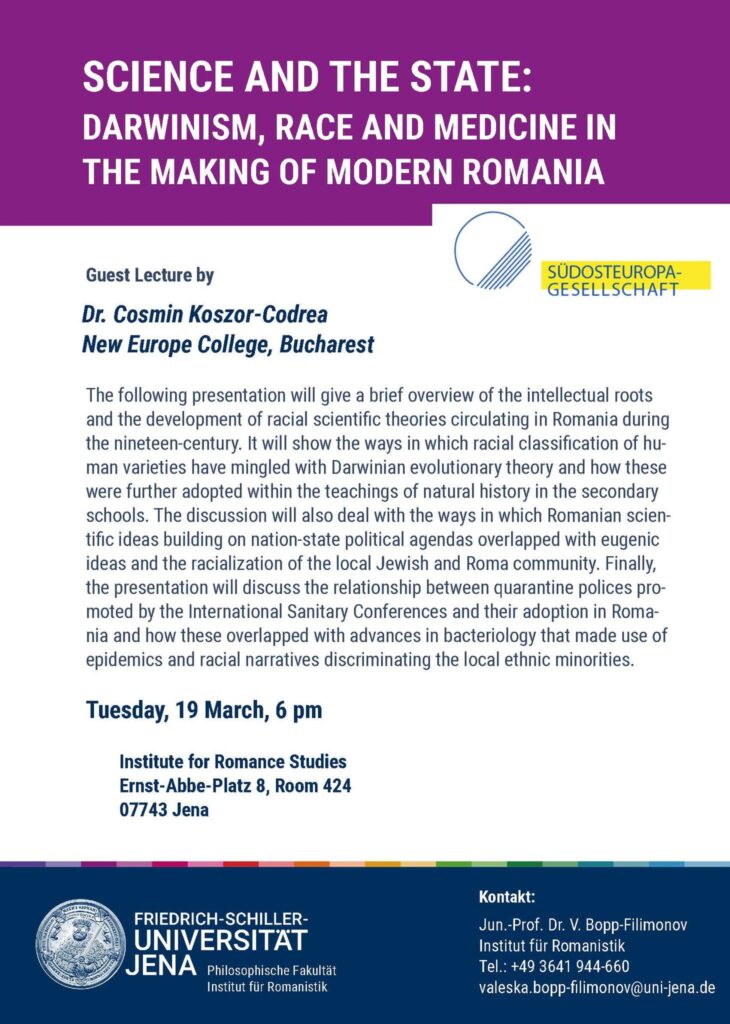
2023
On 14 December 2023, Lidia Trăușan-Matu will give a talk during a monthly meeting of GRIPS, a research group hosted by NEC. Lidia’s paper is entitled “Sănătate și societate. Doctorul Iuliu Barasch și sistemul carantinelor din Țara Românească între 1830 și 1863” (“Health and Society. Doctor Iuliu Barasch and the Quarantine System in Wallachia between 1830 and 1863”. Towards the end of 1829, against the backdrop of the horrors caused by the plague in Romanian society and the panic that preceded its appearance, the Russian General Pavel Kiseleff, Governor of the Principalities between 1829 and 1834, decided to implement Article 6 of the Adrianople Peace Treaty. This allowed Wallachia and Moldavia to organize quarantines and permanent sanitary corridors “along the Danube and elsewhere in the country where they may be needed” as a deterrent against plague and cholera epidemics from the East and Asia. With the help of the writings of Dr. Iuliu Barasch, a quarantine doctor in Călărași between 1843-1845, Lidia Trăușan-Matu aims to describe how the Danube quarantine system of Wallachia worked, according to what model/model it was set up and what functions it fulfilled, where the quarantines were located, what they looked like and who worked in them, what it was like to live in a quarantine for a while and what concerned the people isolated in them. In addition to the work of Iuliu Barasch, the author draws on a range of published and unpublished sources, including mortality lists, medical reports, and articles from the press of the time.
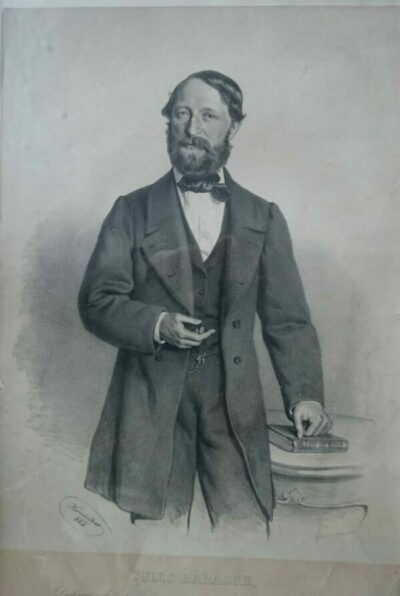
On 6-7 December 2023, Lidia Trăușan-Matu will present a paper at the Annual workshop of the “Nicolae Iorga” History Institute. Lidia’s paper is titled: ‘”Biciul holerei” în Valahia. “Liste de mortalitate” și măsuri de sănătate publică în perioada 1831-1874’ (‘”The Scourge of Cholera” in Wallachia. “Mortality lists” and Public Health Measures from 1831 to 1874″).
On 25 and 26 September 2023, Constantin Ardeleanu presented at the Institute for Balkan Studies of the Bulgarian Academy of Sciences in Sofia two papers related to the topic of this project: “Technologies of purification in Danubian quarantines in the long nineteenth century” and “South-East Europe and international sanitary diplomacy in late nineteenth and early twentieth century”.
On 21 September 2023, Silvia Marton and Constantin Ardeleanu attended the panel “The Faces of Regulations/Modernizations/Changes in South-eastern Europe, 18th-19th centuries” at the Turkologentag 2023, the fourth European Convention on Turkic, Ottoman and Turkish Studies hosted by the University of Vienna. At this panel, Constantin Ardeleanu presented the paper ‘Standardizing the Danubian quarantine system (1830s – 1850s)’ and Silvia Marton spoke about ‘Sanitary reform and “corruption” narratives in Romania (the 1860s–1890s)’
On 14-16 September 2023, Constantin Ardeleanu attended the Annual Conference of the Center for Governance and Culture in Europe of the University of St. Gallen, hosted by the Museum of National HIstory and Archaeology in Constanța. The conference’s topic was “Environment, Energy and Economy in the Black Sea Region”. Ardeleanu presented a paper titled “For the Health of the Nation”, in which he also touched on the relevance of policies meant to preserve public health in late nineteenth century Romania.
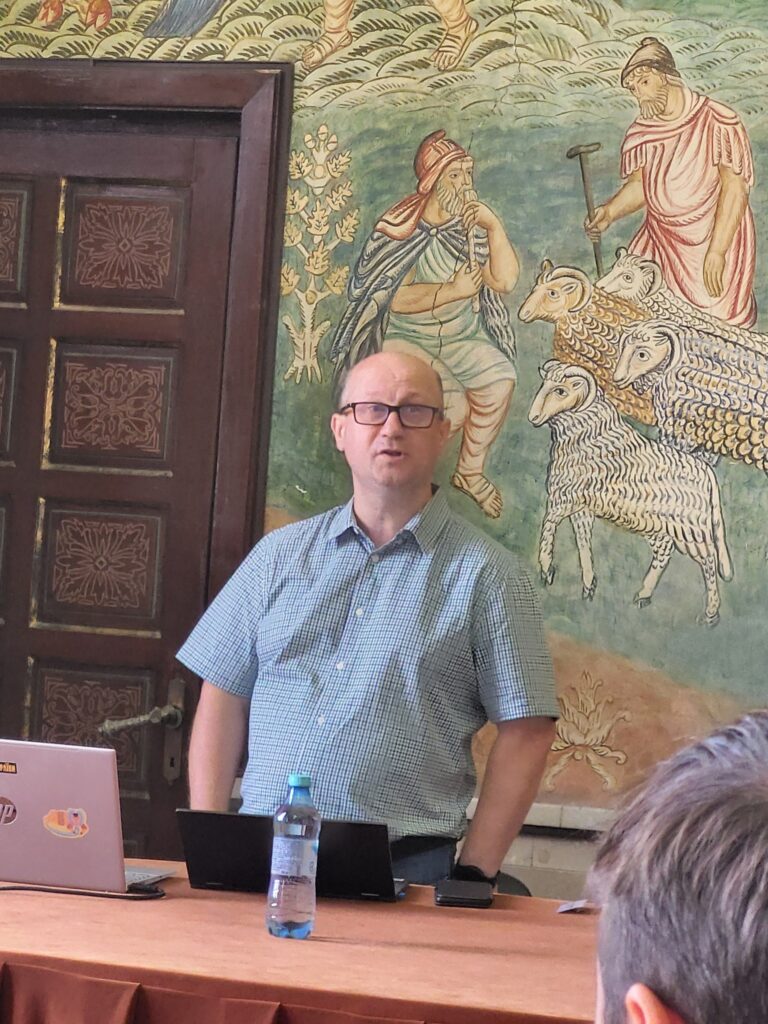
On 22 August 2023, Constantin Ardeleanu attended the 12th ESEH Conference “Mountains and Plains’ organised at the University of Bern. As part of the panel ‘Across State Borders. Non-Human Species Mobility and State-Building in South-East Europe (19th and 20th Centuries)’, Dr Ardeleanu presented the paper ‘Epidemics, Epizooties and Cross-Border Concerns at the Lower Danube in the Long Nineteenth Century’. The Lower Danube became, since the 19th century, a busy transportation corridor for the resources of local states (the Ottoman, Russian, Habsburg empires, Wallachia, Moldavia, later Romania, Bulgaria, Serbia). With the region hit by several waves of epidemic diseases (mainly the plague and the cholera), establishing institutions of defending state borders against such threats was only natural. This paper aims to compare and contrast how local states developed instruments and policies of combating the mobility of epizootic diseases. With the export of sheep from the Danubian principalities to the Istanbul market in Ottoman market in early 19th century or the huge trade in Serbian pig towards Habsburg territories, epizooties were often the object of intense diplomatic conflict and cooperation. Based on a variety of Romanian and international sources, this paper will also look at the transfer of knowledge, technology, and human resources in fighting epidemics and epizooties in an inter-imperial periphery.
On 22 June 2023, Constantin Ardeleanu attended the BIG-D Debate: The Right to Water (Cărturești Verona), where he made a brief presentation on the relation between technology, the environment and public health in the nineteenth century.
On 8 June 2023, Constantin Ardeleanu presented the paper ‘Public Health and Hygiene in a Marshland. Sulina in Late Nineteenth Century’ at the International Workshop “Shifty Muds. Land, Water and Life in a ‘Patchy Anthropocene’” hosted by NEC and organised in the framework of the project ‘State, Communities and Nature of the Lower Danube Islands: An Environmental History (1830-2020)’ (PN-III-P4-ID-PCE-2020-1238)
On 4-5 May 2023, NEC hosted the workshop “Quarantines, Epidemics, Doctors and Public Health in the Danubian Principalities/Romania (1774-1914)”, in the framework of the “Entangled Histories of the Danubian Quarantine System (1774–1914)” Project (PN-III-P4-PCE-2021-1374, funded by UEFISCDI, 2022–2024)
All team members presented papers during the event: Silvia Marton, ‘Epidemics, Reforms and the Redefinition of ‘Corruption’ in the Danube Principalities (1830–1860)’; Constantin Ardeleanu, ‘Drinking Water and Public Hygiene at the Mouths of the Danube (1892–1914)’; Andrei Emilciuc, ‘Russia’s Sanitary Expansion at the Mouths of the Danube (1812–1853)’; Andrei Sorescu, ‘On Winning the War and Losing the Battle with Cholera in Travel Accounts, 1913–1914’.
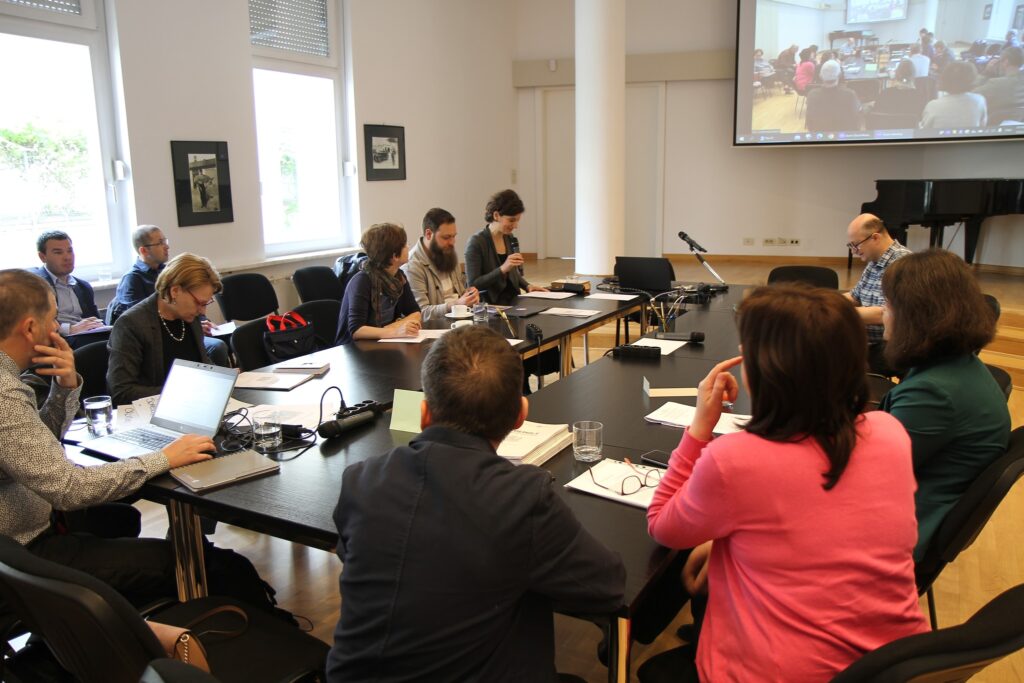
Participants: Constantin Ardeleanu, Constantin Bărbulescu, Virginia Blînda, Simion Câlția, Adrian-Bogdan Ceobanu, Alin Ciupală, Călin Cotoi, Gabriel Felician Croitoru, Andrei Emilciuc, Sorin Grigoruță, Ligia Livadă-Cadeschi, Silvia Marton, Bogdan Mateescu, Ștefan Petrescu, Nicoleta Roman, Andrei Sorescu, Thomas Șindrilariu, Lidia Trăușan-Matu, Constanța Vintilă
The full program is available below.
On 17 February 2023, Constantin Ardeleanu presented the paper “Specialiști români la conferințele sanitare internaționale (Romanian Specialists at the International Sanitary Conferences) ‘ at the workshop ‘Consultanți, specialiști și experți în relațiile internaționale ale României (secolele XIX–XXI) (Consultants, Specialists and Experts in Romania’s International Relations (19th-21st Centuries)‘ hosted by the New Europe College.
2022
On 28 October 2022, Andrei Emilciuc presented the paper “Organizarea şi funcţionarea cordonului sanitar la hotarele dunărene ale Imperiului Rus (1812-1856)” (Organization and functioning of the sanitary cordon at the Danube borders of the Russian Empire (1812-1856)) at the Scientific Conference “History – Archaeology – Museology”, 32nd edition organized by the National Museum of History of Moldova in partnership with the Faculty of History and Philosophy, the State University of Moldova and the Faculty of Philology and History, “Ion Creanga” State Pedagogical University of Chișinău.
On 27 October 2022, Constantin Ardeleanu presented the paper ‘Cholera and Ottoman Abuses. French Physicians on Danubian Epidemics in the Second Half of the 19th Century’ at the international annual conference of the Institute of South-East European Studies in Bucharest. The conference’s topic was La présence française dans le Sud-Est européen à l’époque moderne (XIXe-XXe s.).
On 21 October 2022, Constantin Ardeleanu attended the workshop “Revolution, War and Trade in an Age of Upheaval. The Eastern Mediterranean between the Greek Revolution and the Egyptian-Ottoman War (1821-1841)” organized by the Department of History and Archaeology of the University of Nicosia, Cyprus. At this workshop he presented a paper entitled “The Transportation Revolution in the Black Sea and the Eastern Mediterranean (1830s-1850s)”, in which he referred to the relationship between mobility and the spread of disease.
On 19 October 2022, Constantin Ardeleanu made a presentation of the project during a weekly seminar organized by NEC with its current fellows.
On 10 September 2022, Constantin Ardeleanu took part in a roundtable discussion entitled “Istoria mediului și istoria tehnologiei în Europa de Est. Noi direcții paradigmatice în istoriografie”. The discussion was included in the program of the National Congress of Romanian Historians, organized in Alba Iulia (p. 130).
On 10 September 2022, the book recently published by Andrei Emilciuc, Basarabia în procesul de integrare a Imperiului Rus în sistemul comerțului european (1812 – anii 60 ai sec. al XIX-lea), Lexon, Chișinău, 2021 (ISBN 9789975329170) was presented during a book fair organized as part of the National Congress of Romanian Historians (p. 147).
On 9 September 2022, Constantin Ardeleanu presented a paper titled “Sănătate publică și geopolitică la gurile Dunării. Rolul carantinelor dunărene în disputele interimperiale în secolul al XIX-lea” (Public Health and Geopolitics at the Mouths of the Danube. The Role of Danubian Quarantines in Interimperial Disputes during the 19th Century) at the National Congress of Romanian Historians, organized in Alba Iulia (p. 87).
On 7 July 2022, Constantin Ardeleanu attended the European Society for Environmental History Congress hosted by the University of Bristol. Ardeleanu was a participant in the panel “The River as a Web: Infrastructure, Environment and Governance of the Lower Danube (1800-2020)”, where he presented a paper titled “Fish and Ships at the Lower Danube. A Recipe of Destruction and Salvation (19th and 20th centuries)” linked to the clash between the divergent ways in which engineers and naturalists, public health experts and tradesmen viewed the role of the Danube as a corridor of prosperity or of disease.
On 22-23 June 2022, Constantin Ardeleanu presented a paper at the international workshop “European Sea Spaces and Histories of Knowledge” organized at the University of Tallinn and the Center for Advanced Study of the University of Helsinki. Ardeleanu presented the paper “Steamship Connectivity in the Black Sea (1830s-1850s)” with references to the clash between mobility and quarantine policies in the Black Sea and Danubian ports.
